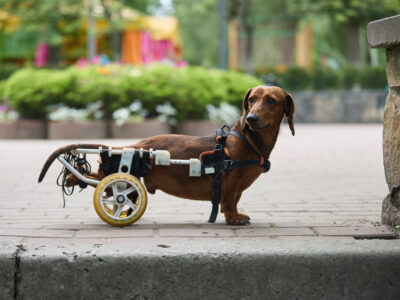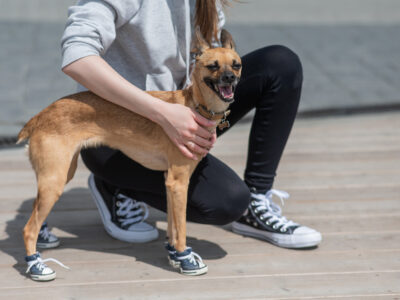
Table of Contents[Hide][Show]
Being the caretaker of a paralyzed pet isn’t everyone’s cup of tea. And even though the people around you are supportive, because they know it’s what you want to do, there will come a time when your friends think you need an intervention.
I was completely surprised when it happened to me. It’s my goal to make sure you’re prepared to handle this conversation when your well-meaning friends sit you down for…a chat.
Being a caretaker is personal
My girlfriends love their pets as much as I do, but there are very few who would’ve committed five years of their lives to a severely handicapped dog like Sophie. It’s a personal choice and a deeply intimate experience.
I’ve often compared it to becoming part of an exclusive club that you never wanted to join. But once you’re part of this club you do the very best to stay a member because the alternative means you’ve lost your battle. You’ve lost your treasured pet.
If your friends haven’t walked in your shoes, they will be able to sympathize with you, but they’ll never fully understand your experience or your range of emotions.
The night of the intervention
I take responsibility for the intervention. It happened at a BBQ at my house. I was trying to play hostess to my friends while also taking care of Sophie’s needs. And I was complaining a bit.
Three of my girlfriends took this as an opportunity to talk with me. I don’t think they planned on having an intervention that night, but I got the impression they had definitely discussed the matter before.
Their conversation started near the end of the evening when they urged me to sit down and relax. I was tired so I complied with their request and sat down on the leather sofa in my family room.
My friends sat around me while Sophie rested in her bed in the middle of the room.
The conversation
One-by-one each woman told me how exhausted I looked and that I was getting too thin.
One friend looked down at my sleepy dog and said, “We know how much you love Sophie, but there has to be a time when you realize you’ve done all you can for her. We think it might be time to say goodbye.”
I’ll never be able to explain how shocked I felt by their words, but I didn’t yell at anyone. I tried to compose myself before addressing them.
Then I told the group how important it was to Ken that we didn’t play God with Sophie’s life. I explained that there would be a day when she stopped eating and we would make the decision then.
I also wanted to tell them, but I couldn’t find the words, that I knew Sophie was deteriorating and each day I asked myself if it was time. I wanted them to know that I wasn’t ready to say goodbye because once the decision was made, I could never take it back.
My girlfriends continued their end of the conversation for a long time. Each pressed on about the changes they saw in our family, and they were right. Sophie was getting weaker and Ken and I were getting frustrated trying meeting her needs. Our nerves were thin and the stress was mounting.
Their points were valid and I knew they were coming from a place of love. They were truly concerned for the well-being of my family.
What they didn’t know
What they didn’t realize was that I raised Sophie from the time she was a small puppy who was deathly ill with Distemper. They didn’t know I had already felt the pain of saying goodbye to seven dogs and five cats and how I wasn’t ready to do it again. I didn’t want to close Sophie’s chapter in our life.
It was a painful and eye-opening evening. Ultimately, I thanked my buddies for their honesty and concern. The intervention ended with me saying, “Death is forever. Once I make the decision to euthanize Sophie, I won’t be able to take it back. For now, it’s an option we can choose another day.”
Your intervention
My friends continued to give me concerned looks, but they never mentioned the subject again.
If you’re the caretaker for a disabled pet, you might be asked to an intervention in the future. I hope this story will prepare you.
Almost done. Click to read more.





Leave a Reply